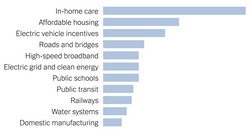President Biden has a plan of funding and improving infrastructure throughout the United States. Biden’s program will not only cover ‘traditional’ infrastructure like federal funding for bridges and roads but will also focus on additional issues like climate change and investing in green energy.
President Biden has already signed a COVID-19 economic relief bill which granted Americans a stimulus check of $1,400. Democrats have a majority in the House of Representatives, Senate, and Presidency, a term known as “united government,” yet there have been some concerns that moderates like Senators Tester, Sinema, Manchin, etc. will stop more “progressive” leaning bills from passing.
The infrastructure plan has been met with criticism from Congressional Republicans; they have argued the bill is mostly “pork spending,” saying it does not focus on important issues concerning national infrastructure. There has also been criticism for the bill’s estimated price of two trillion dollars. The White House in response has offered to make a compromise to a lower at a price of 800 billion dollars.
Joseph Patten, Ph.D., Associate Professor in Political Science said, “I don’t think this bill is going to be bipartisan. The Senate Majority leader has already spoken to the parliamentarian and technically they could pass this with zero republican support. This bill would emphasize not only roads and bridges but the idea of human infrastructure- daycare, more government assistance, etc.”
Patten predicted some other issues might be debated in the coming months. He said, “In terms of what this Congress could do until the midterms, I think there is a chance the federal minimum wage might get raised. It has not been changed since 2009. Probably not fifteen dollars an hour like what Bernie Sanders has argued for but maybe a compromise to $10 or $11 an hour. I don’t think there will be major bills that get through especially hot topic issues (on both sides) like strict gun control or immigration reform.”
Similarly, like Infrastructure, other proposed bills that have been mentioned in the House of Representatives under Biden’s presidency. These include the Equality Act- which would expand federal government anti-discrimination laws, the Judicial Act of 2021- which would increase the number of Supreme Court justices to 13 instead of the current number of nine, and HR 127, a bill which would expand federal gun registration and gun control restrictions.
Jen McGovern, Ph.D., Assistant Professor of Political Science and Sociology, believes the bill does have potential to assist the current recovering economy. She said, “The bill, as it is currently laid out, does seem to have provisions to increase jobs. Some of those jobs would be in construction and engineering, such as repairing roads and bridges. The plan also proposes to increase jobs in the green energy sector, installing broadband in rural areas, and increasing job training and human capital in certain industries.”
McGovern said that in the past, such government investments have created new jobs and she believes this bill can do that.
McGovern also discussed the general focus of the Biden administration. She said, “Reporters have noted that the Biden administration is likely to release ‘The American Family Plan’ before the midterms. This plan would probably address education, paid leave, and childcare. In addition to the infrastructure bill, such a plan would be in line with many of the things Biden-Harris ran on. Americans have long been demanding reform in these specific areas. If passed, these policies have the potential to help many families and therefore, I do think the administration would try to propose such legislation.”
She also noted how the political term “infrastructure” could be reinterpreted today saying, “This bill is asking us to rethink the meaning of infrastructure– the underlying systems that help the country’s economy run smoothly. Traditionally, this has referred to things like roads, bridges, utilities, and airports which clearly help people and goods move effectively. While these things are still needed, our country has much more a service-based economy than when the federal government last passed. Because of this transition, investing in people and services is absolutely needed to help the economy run smoothly.”
Connor Vidnansky, a sophomore political science student said, “President Biden has proposed a $2 trillion infrastructure plan or as he calls it the “American Jobs plan.” The plan will create many jobs and help tackle climate change. It has goals to fix highways, rebuild bridges, upgrade ports, upgrade airports and transit systems. Additionally, it will modernize about 20,000 miles of highways, roads, and has goals to create jobs that have to do with electric vehicles.”
He continued, “The president is proposing a $174 billion investment in the EV market. In addition, the plan calls for $100 billion to build new public schools and upgrade school buildings. Corporate companies may not like this bill as their tax will rise from 21 percent to 28 percent. Although this is called an infrastructure plan, there are many different things included in the bill that does not have to do with infrastructure.”
Vidnansky then said the U.S. does not have that type of money to spend right now. “Biden says people making under $400,000 will not get taxed more, but that is hard to believe. The bill cannot be paid for unless the middle and lower classes get taxed more. Many people are skeptical about this bill as it will tax the middle class and may not be as effective as Biden says it will be. In my opinion, the Biden infrastructure plan has great intentions to help the American people, but I am concerned people will get taxed more and it will not be as effective as he says,” he said.
IMAGE TAKEN from The New York Times



